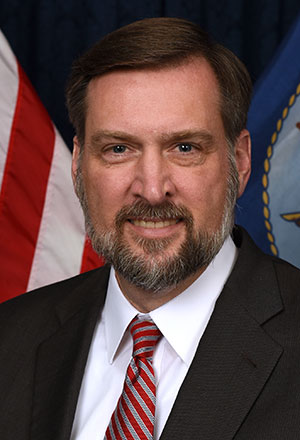Thomas Beutner
Deputy Director, Tactical Technology Office, Defense Advanced Research Projects Agency (DARPA)
United States Department of Defense
BSAAE 1987
For major impacts in Air Force and Naval research, specifically in advanced technology demonstrations and engineering simulation development that has improved performance, affordability and reliability of aircraft and weapons systems
“I don’t think it’s possible to plan a career, but it is possible to prepare for one,” Thomas Beutner says. “A good education is the best preparation. There is a great deal of uncertainty and a bit of randomness in the opportunities that present themselves. But some of the ideas I became interested in at Purdue later became career opportunities. Getting the fundamentals right and valuing the knowledge you gain are essential to preparing for a career.”
What he learned at Purdue has been crucial to Beutner, who has served as department head for air warfare and weapons in the Office of Naval Research. In that role, he was responsible for the Navy’s science and technology investments in aircraft and air and surface weapons technology programs. He recently moved to the Defense Advanced Research Projects Agency of the U.S. Department of Defense, where he has been named Deputy Director of the Tactical Technology Office. “Purdue taught me how to think about problems and how to decompose them,” Beutner says. “Through many different projects and research efforts, those fundamentals have been a bedrock that anchors all other knowledge.”
“As a co-op student,” Beutner says, “I had the opportunity to work on advanced design efforts in industry while I was still an undergrad. Nothing could have been more compelling. It changed the way I thought about classroom education. I came back motivated and full of questions. The classes I took fit together the pieces of the puzzle I’d seen. The chance to have a glimpse of where all this was going, while I was still in school, was a tremendous opportunity.”
Beutner’s early research included new diagnostic techniques for wind-tunnel testing that allowed detailed velocimetry measurements of vortex burst phenomena. His primary role now is as a manager, and he has led efforts to explore oblique wing designs, use flow control for alleviation of aero-optic distortions, demonstrate autonomous formation flight with transport aircraft, develop railgun technologies, conduct sea-based demonstrations of high energy lasers and demonstrate novel concepts for sea-based aviation.
Beutner urges today’s undergraduates to be lifelong learners. “Access to information, the opportunity to collaborate with others around the world, and the access to computing power are things that have never been available to any previous generation in the way that they are available today,” he says. “Think big. Try to surround yourself with the smartest people you can find, and learn all that you can from them. Never stop self-educating.”
Chance favors the prepared mind.”Louis Pasteur
Career Highlights
| 2018-present | Deputy Director, Tactical Technology Office, Defense Advanced Research Projects Agency (DARPA), United States Department of Defense |
|---|---|
| 2014-2018 | Department Head, Air Warfare and Weapons, Office of Naval Research |
| 2010-2014 | Director, Aerospace Sciences Research Division, Air Warfare and Weapons Department, Office of Naval Research |
| 2005-2010 | Program Manager, Tactical Technology Office, DARPA |
| 1999-2005 | Program Manager, Turbulence and Rotating Flows, Air Force Office of Scientific Research |
| 1993-1999 | Technical Area Lead, Advanced Diagnostics, Air Vehicle Directorate, Air Force Research Labs |
Education
| 1987 | BS Aeronautical and Astronautical Engineering, Purdue University |
|---|---|
| 1988 | MS Aeronautics and Astronautics, Stanford University |
| 1994 | PhD Aeronautics and Astronautics, Stanford University |
| 2002 | Senior Executive Fellows Program, Harvard University |

